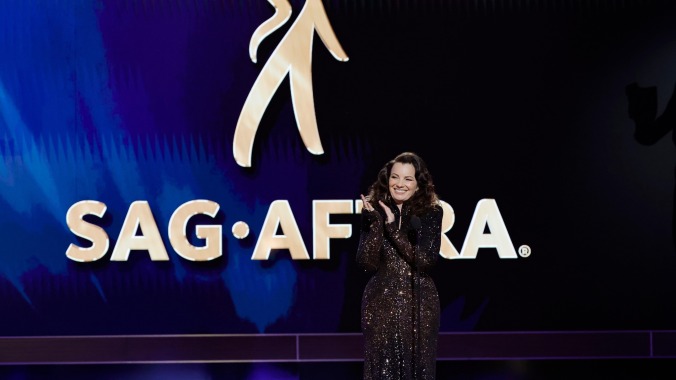The national board of SAG-AFTRA (The Screen Actors Guild and American Federation of Television and Radio Artists) has unanimously decided to order a strike authorization vote, according to The Hollywood Reporter. The union begins negotiations with the AMPTP (The Alliance of Motion Picture and Television Producers) on June 7 over a contract that expires on June 30. The decision comes amid the Writers Guild of America strike, which is already causing major disruptions in Hollywood.
The last actors’ strike was in 2000, after which SAG and AFTRA merged into one union. In more recent years, the guild has threatened to call an authorization vote (and once did so, over the TV animation contract, in 2018, per THR) in order to strengthen its position, but managed to come to an agreement with the AMPTP. It may once again be the case that calling the vote alone is enough to scare the studios into making a deal. After all, the WGA already being on strike only strengthens SAG’s position. Having two major Hollywood unions in a work stoppage at the same time could take the current state of the entertainment industry from seriously disruptive to outright catastrophic.
On top of that, the Directors Guild of America also has a contract expiring on June 30. Leadership of both unions has expressed solidarity with the WGA’s strike, and again, many of the issues writers are fighting for on the picket lines are universal to the average Hollywood laborer. (Those high-profile and highly-paid actors and directors we know and love tend to be the exception, not the rule, to the average union member.) There is a strong possibility of an unprecedented show of solidarity in the entertainment industry, one that could force a huge reckoning in the streaming era.
That being said, the DGA has already begun its negotiations with the AMPTP (per THR), and has not yet called for a strike authorization vote. Comedian Paul Scheer, a “proud DGA & WGA member,” tweeted that in private communications with DGA leadership they “preferred admonishing the WGA [without] any ideas on how to work together.” Discord amongst the various unions behind the scenes would certainly work in the studios’ favor. If one guild accepts less in the way of residuals, for example, would it weaken the other unions’ position on the same issue? The unity of purpose in many of the guilds’ aims is why both writers and actors alike have taken to Twitter to encourage SAG members to vote in favor of the authorization vote, with many inviting the DGA to join in lockstep.
CEOs of streaming services and premium cable networks are on record as having a stockpile of content—that is, content already filmed and ready to go—to continue serving subscribers throughout the year. But a simultaneous strike of two (or three) of the Hollywood guilds would likely put an end to the projects that have attempted to continue production without the writers. (It should be noted, too, that streamers and traditional networks have different approaches to television—the networks, which largely don’t have the same backlog of new content to draw from, would have more motivation to end a strike anyway, and certainly would in the case of a simultaneous strike.)
Should a simultaneous strike go forward—or even just authorized, in the case of this upcoming SAG vote—it could mean a quicker end to the current work stoppage, and force the AMPTP to make a fair deal for the average working writer and actor (and maybe director!) alike. Certainly, all eyes will be on the upcoming negotiations come June to see how it all pans out.

 Keep scrolling for more great stories.
Keep scrolling for more great stories.
